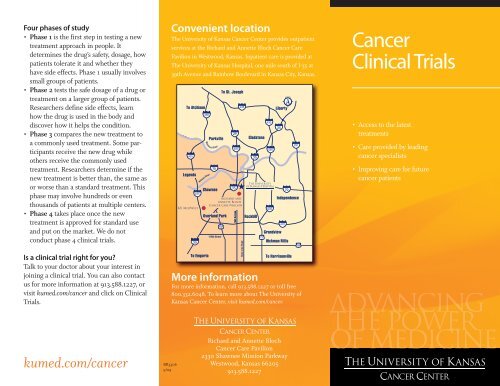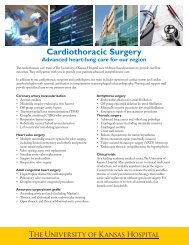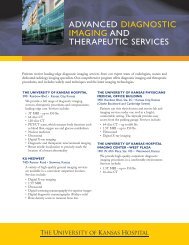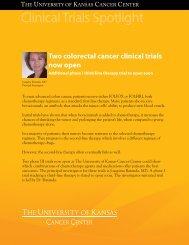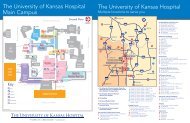Cancer Clinical Trials Brochure - The University Of Kansas Hospital
Cancer Clinical Trials Brochure - The University Of Kansas Hospital
Cancer Clinical Trials Brochure - The University Of Kansas Hospital
- No tags were found...
You also want an ePaper? Increase the reach of your titles
YUMPU automatically turns print PDFs into web optimized ePapers that Google loves.
Four phases of study• Phase 1 is the first step in testing a newtreatment approach in people. Itdetermines the drug’s safety, dosage, howpatients tolerate it and whether theyhave side effects. Phase 1 usually involvessmall groups of patients.• Phase 2 tests the safe dosage of a drug ortreatment on a larger group of patients.Researchers define side effects, learnhow the drug is used in the body anddiscover how it helps the condition.• Phase 3 compares the new treatment toa commonly used treatment. Some participantsreceive the new drug whileothers receive the commonly usedtreatment. Researchers determine if thenew treatment is better than, the same asor worse than a standard treatment. Thisphase may involve hundreds or eventhousands of patients at multiple centers.• Phase 4 takes place once the newtreatment is approved for standard useand put on the market. We do notconduct phase 4 clinical trials.Is a clinical trial right for you?Talk to your doctor about your interest injoining a clinical trial. You can also contactus for more information at 913.588.1227, orvisit kumed.com/cancer and click on <strong>Clinical</strong><strong>Trials</strong>.Convenient location<strong>The</strong> <strong>University</strong> of <strong>Kansas</strong> <strong>Cancer</strong> Center provides outpatientservices at the Richard and Annette Bloch <strong>Cancer</strong> CarePavilion in Westwood, <strong>Kansas</strong>. Inpatient care is provided at<strong>The</strong> <strong>University</strong> of <strong>Kansas</strong> <strong>Hospital</strong>, one mile south of I-35 at39th Avenue and Rainbow Boulevard in <strong>Kansas</strong> City, <strong>Kansas</strong>.To AtchisonLegendsTo EmporiaParkvilleShawneeTo St. JosephRichard andAnnette Bloch<strong>Cancer</strong> Care PavilionOverland ParkNall AvenueGladstoneRockhillGrandviewLibertyIndependenceHickman MillsTo HarrisonvilleMore informationFor more information, call 913.588.1227 or toll free800.332.6048. To learn more about <strong>The</strong> <strong>University</strong> of<strong>Kansas</strong> <strong>Cancer</strong> Center, visit kumed.com/cancer.<strong>Cancer</strong><strong>Clinical</strong> <strong>Trials</strong>• Access to the latesttreatments• Care provided by leadingcancer specialists• Improving care for futurecancer patientskumed.com/cancerBR33069/09Richard and Annette Bloch<strong>Cancer</strong> Care Pavilion2330 Shawnee Mission ParkwayWestwood, <strong>Kansas</strong> 66205913.588.1227
Our team of researchers, physiciansand care staff conduct clinical trials totest new treatment options and toimprove care and outcomes for futurecancer patients.Medical research finds ways to help peoplelive longer, improve their quality of life,and manage or cure disease. This ispossible because of the people whovolunteer to participate in clinical trials.At <strong>The</strong> <strong>University</strong> of <strong>Kansas</strong> <strong>Cancer</strong> Center,we strive to provide the most advancedcare possible. In addition to standard careand treatments, we perform studies to helpfind better ways of preventing, diagnosingand treating various types of cancer.What are clinical trials?<strong>Clinical</strong> trials test how new medications ortreatments work. Patients who participatehave access to these new drugs andtreatments. By joining a clinical trial, youcan contribute to the medical knowledgethat may improve your cancer care andhelp future patients battle the disease.How are clinical trials monitored for safety?All clinical trials are guided by strict rules that aremonitored by the National Institutes of Health andthe Food and Drug Administration.Before it can begin, each clinical trial is approved byan institutional review board, made up of medicalspecialists, nurses and other professionals. As youradvocate, the IRB will only approve care that tries toanswer medically important questions in a scientificand responsible way.Who can participate in clinical trials?Each clinical trial has its own eligibility requirements.Criteria include factors such as your age,gender, type and stage of disease, previous treatmenthistory and other medical conditions.Will my care be provided in the same way it isfor other patients?Care for patients in clinical trials is provided in thesame way standard treatment is provided. Yourphysicians, nurses and other professionals will carefor you, keep you informed about your treatment andmeasure your progress. To ensure reliable results, it’simportant for you to follow the care team’s instructions.What is informed consent?Participation in clinical research is voluntary. Beforeyou join a clinical trial, a member of the researchteam will meet with you to review eligibility, risks,benefits and details of care and treatment.You will receive a consent form that explainsthe study. Before signing the form, carefullyread it, ask questions and make sure youunderstand it.You are free at any time to change your mindand withdraw from the study.What are the benefits to participation?By participating in a clinical trial, you haveaccess to new treatments not availableelsewhere. You also have access to regular,careful medical attention from a highlyqualified care team. Additionally, you willcontribute to cancer research, which can helpother cancer patients in the future.Are there drawbacks to participation?New treatments aren’t always better than thestandard treatments. Also, as a studyparticipant, you may be required to visit thedoctor more often than you would withstandard treatment. And you may have moreblood drawn for laboratory tests.Some health insurance plans may not coverall care costs involved. Before you join astudy, check with your insurance provider tosee what is covered. Some state and federalprograms help patients pay for care costsassociated with clinical trials.THE UNIVERSITY OF KANSAS CANCER CENTER


